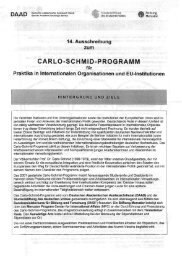- Seite 2 und 3:
TRIAL .I 0 F THE MAJOR WAR CRIMINA
- Seite 4 und 5:
VOLUME XL 0FF.ICIAL TEXT ENGLISH ED
- Seite 6 und 7:
KEY TO TYPES AND SYMBOLS Explanator
- Seite 8 und 9:
SPECIMEN THE DOCUMENT (REPRODUCED O
- Seite 10 und 11:
von den Reichsleitern, Gauleitern u
- Seite 12 und 13:
Affidavit Fraeulein Else K r u e g
- Seite 14 und 15:
DOCUMENT DUNITZ-1 ENTRIES IN THE DI
- Seite 16 und 17:
moglichen Schritte, um zu einem kla
- Seite 18 und 19:
Inhalt der Besprechung: Vorbereitun
- Seite 20 und 21:
abgesucht. - Die Schiffsversenkunge
- Seite 22 und 23:
Wahrend dieser Zeit wurde in den Au
- Seite 24 und 25:
Dbnitz-1s Viertes S: U Ti An ..- .
- Seite 26 und 27:
19.12.39.-25. 3.41. : 1I.Wachoffizi
- Seite 28 und 29:
der 'Heimatausbildung den richtigen
- Seite 30 und 31:
A u s : Kriegstagebuch des Befehlsh
- Seite 32 und 33:
Botschafter angekuendigten Befehl n
- Seite 34 und 35:
1650- Qu. FF 7472 1705 Schiffbruchi
- Seite 36 und 37:
in die Rettungsboote gekommen zu se
- Seite 38 und 39:
84 Ausgang F.T. 1930117 163 Italien
- Seite 40 und 41:
Dampfer gibt auf 25 m: SSS SSS degj
- Seite 42 und 43:
F.T. eingegangen: 1) Hartenstein sa
- Seite 44 und 45:
F.T. eingegangen: 1) Witte tritt an
- Seite 46 und 47:
2142 9678 Passat 3-4, fast bed. Auf
- Seite 48 und 49:
Geheime Kommandosache! Priif-Nr.: 9
- Seite 50 und 51:
-8- i n oc h 2.9.43. Biskaya 0625
- Seite 52 und 53:
Vor dem unterzeichneten Richter ers
- Seite 54 und 55:
keinem Befehl gelesen oder gehort,
- Seite 56 und 57:
-411e Lazarettschiffe sollen ferner
- Seite 58 und 59:
e) Kanada: "Lady Nelson" f) Neuseel
- Seite 60 und 61:
von Major G.I.D. Draper (Irische Ga
- Seite 62 und 63:
A. 14: Es war der Fall ,,Hartenstei
- Seite 64 und 65:
A. 29: Sie sollten nach Moeglichkei
- Seite 66 und 67:
3'. 48: Wuerden Sie erwartet haben,
- Seite 68 und 69: was von dem Enterkommando dazu benu
- Seite 70 und 71: E r s t e s S : Kopf jeweils gedr A
- Seite 72 und 73: englischer Torpedierung mittschiffs
- Seite 74 und 75: DOCUMENT DONITZ-41 STATEMENT BY FOR
- Seite 76 und 77: Donitz-41 Zweites S: Hans Witt Korv
- Seite 78 und 79: Erstes S: Ds I U Blau Herrn Flotten
- Seite 80 und 81: Das Lager machte in jeder Beziehung
- Seite 82 und 83: He speaks English well and is the '
- Seite 84 und 85: Z w e i t e s S : quershnittartiger
- Seite 86 und 87: Lfd. Nr. 38 N a m e Dstgrd. a) Adel
- Seite 88 und 89: DOCUMENT DUNITZ-53 DECLARATION BY 6
- Seite 90 und 91: Gotz Roth Oblt. z. S. B 105 207 Car
- Seite 92 und 93: 3 Anlagen Schellbrief. Wegen des Fa
- Seite 94 und 95: - Seite 3 - Athen, Bangok, Belgrad,
- Seite 96 und 97: the form of Admiralty Merchant Ship
- Seite 98 und 99: 67. Conduct when attacked by a subm
- Seite 100 und 101: DOCUMENT DONITZ-73 TELEGRAPHIC ORDE
- Seite 102 und 103: ) Es murj von allen neutralen Schif
- Seite 104 und 105: Einige Warnungsschusse uber den Bug
- Seite 106 und 107: Regenschauer, gute Sicht, hohe Diin
- Seite 108 und 109: DBnitz-90 Erste Ausfertigung. Numme
- Seite 110 und 111: - Seite 3 - Die vorstehende in die
- Seite 112 und 113: Hitler zum ,,Reichskommissar fur di
- Seite 114 und 115: der beabsichtigten Politisierung de
- Seite 116 und 117: Obwohl durch die Verordnung vom 20.
- Seite 120 und 121: HINWEISE: DOCUMENT DUNITZ-7 Abkomme
- Seite 122 und 123: A.) Frank haette auf einer Juristen
- Seite 124 und 125: Personen konnten am Tage der Kapitu
- Seite 126 und 127: In einzelnen Haeuserblocks jst es v
- Seite 128 und 129: ' DOCUMENT FRANK-19 AFFIDAVIT BY TH
- Seite 130 und 131: 15.) Unterstanden die Koazentration
- Seite 132 und 133: weit wie moeglich von Zwangsmassnah
- Seite 134 und 135: Frank-19 . funktionierten. Nach den
- Seite 136 und 137: Zu 20. Frank's Stellung zu der poln
- Seite 138 und 139: Zu 31. Vom Herbst 1941 ab wurde in
- Seite 140 und 141: An den Herrn Generalsekretar des In
- Seite 142 und 143: und Obersten Reichsbehoerden die Be
- Seite 144 und 145: HEADQUARTERS NINTH INFANTRY DIVISIO
- Seite 146 und 147: - Seite 3 - dahin, dass erhebliche
- Seite 148 und 149: gebunden fuhlten. Da sich die Absic
- Seite 150 und 151: aber aus Gesprachen bekannt, dass d
- Seite 152 und 153: 8.) Wie war grundsaetzlich die Eins
- Seite 154 und 155: Jahr mit Beschwerden ueber das Gewa
- Seite 156 und 157: HEADQUARTERS NINTH INFANTRY DIVISIO
- Seite 158 und 159: - Seite 3 - 13. Ich nehme an, dass
- Seite 160 und 161: wprden war, weil er im Monat vorher
- Seite 162 und 163: 6.) An welche Aeusserungen inbezug
- Seite 164 und 165: Erfahrungen in dieser Richtung erst
- Seite 166 und 167: - Seite 2 - die ganze Gegend unters
- Seite 168 und 169:
Biirckel die aufrichtige Linie sein
- Seite 170 und 171:
Die tragende Idee der nationalsozia
- Seite 172 und 173:
eindeutig unterstrichen und daher h
- Seite 174 und 175:
Sehr geehrter Herr Rechtsanwalt! We
- Seite 176 und 177:
sowohl der Weirnarer Republik wie a
- Seite 178 und 179:
dass ich Dr. Frick dabd auf meiner
- Seite 180 und 181:
I DOCUMENT FRITZSCHE-2 AFFIDAVIT, 1
- Seite 182 und 183:
Fritzsche hat auch bei seiner Perso
- Seite 184 und 185:
Bemerkungen hatte Fritzsche stets d
- Seite 186 und 187:
- Seite 9 - stritt er aus seiner ei
- Seite 188 und 189:
Fritzsche-3 - Seite 3 - stimrnt wor
- Seite 190 und 191:
eine grosse Pfllanzenzucht. Als mlc
- Seite 192 und 193:
schlieRe, daR umgekehrt auch Beweis
- Seite 194 und 195:
Albert Oeser Herrn Dr. F. Sauter In
- Seite 196 und 197:
Ich wei8, dass falsche eidesstattli
- Seite 198 und 199:
DOCUMENT FUNK-3 AFFIDAVIT BY MRS. F
- Seite 200 und 201:
Dr.F.Sauter I.M.T. Nuernberg, 20.2.
- Seite 202 und 203:
DOCUMENT FUNK-14 AFFIDAVIT BY MAX A
- Seite 204 und 205:
5.) Waehrend der ganzen Zeit, wo Fu
- Seite 206 und 207:
sagte mir nur, dass der Stab sich i
- Seite 208 und 209:
participating in the trial and FUNK
- Seite 210 und 211:
A n t w o r t z u F r a g e 2 : Fun
- Seite 212 und 213:
Welche Haltung hat FUNK eingenommen
- Seite 214 und 215:
waren, wahrend die Regelung der Eig
- Seite 216 und 217:
Fr a g e 10 : MuBten Sie nach der i
- Seite 218 und 219:
die eigentlichen Zustandigkeiten de
- Seite 220 und 221:
ihm als dem Staatssekretar im Minis
- Seite 222 und 223:
Anordnungen ohne Rechtsgrundlage, s
- Seite 224 und 225:
Funk-16 Antwort zu A: I. FUNK oder
- Seite 226 und 227:
nie teilgenommen hat, wurden haufig
- Seite 228 und 229:
Chefs der Militarverwaltung und der
- Seite 230 und 231:
gewaedt hat, da13 derartige Aufkauf
- Seite 232 und 233:
Geschaften,Aktien oder anderen Inte
- Seite 234 und 235:
die Festsetzung oder Veranderung de
- Seite 236 und 237:
Funk-16 Reichswirtschaftsministers
- Seite 238 und 239:
Funk-16 Zuteilung und Verwendung vo
- Seite 240 und 241:
An den Zeugen E m i 1 P u h 1, frue
- Seite 242 und 243:
Funk-17 12. Welche Finanzpolitik ve
- Seite 244 und 245:
ZU 3. endgultige Regelung spater st
- Seite 246 und 247:
Zu 15 Die Reichsbank hatte keine Be
- Seite 248 und 249:
- Seite 2 - oder irgendeinem andere
- Seite 250 und 251:
D Die Festsetzung der Paritaten wur
- Seite 252 und 253:
Dachau, Deutsckland, machtig sowohl
- Seite 254 und 255:
- Seite 3 - gegen den Widerstand vo
- Seite 256 und 257:
A. : Das entzieht sich meiner Kennt
- Seite 258 und 259:
F. : 5. b.) Welcher Art waren die A
- Seite 260 und 261:
DOCUMENT GORING-22 REPLIES TO INTER
- Seite 262 und 263:
Answer. Sho,rt records are normally
- Seite 264 und 265:
Eidesstattliche Erklarung des Gene
- Seite 266 und 267:
DOCUMENT GORING-38 STATENENT, 27 FE
- Seite 268:
In scharfen Worten tadelte er bei d
- Seite 271:
DOCUMENT GORING-58 DRAWING BY COLON
- Seite 274 und 275:
In der Kleitdung eine ganze Menge t
- Seite 276 und 277:
Herz ganz flach, Ventrikel leer. He
- Seite 278 und 279:
14. Eine Struktur der Nieren beider
- Seite 280 und 281:
Bei den Arbeiten und Beratungen der
- Seite 282 und 283:
mehr unregelmaessig. Die Beine sind
- Seite 284 und 285:
DOCUMENT HESS-13 UNDATED AFFIDAVIT
- Seite 286 und 287:
minutes dated 17.XI.1941." I die Bi
- Seite 288 und 289:
- Seite 5 - - Seite 6 - verwirklich
- Seite 290 und 291:
Dr.G: - than there has yet been and
- Seite 292 und 293:
J: Das weiss ich nicht mal, ob die
- Seite 294 und 295:
"With regard to Iraq, which came in
- Seite 296 und 297:
Dr.G: No doubt, but you will forgiv
- Seite 298 und 299:
Deutschland unerhorte Opfer gebrach
- Seite 300 und 301:
- Seite 2 - 1. Im Fruehsommer 1939
- Seite 302 und 303:
Graf Schulenburg, nicht jedoch ich
- Seite 304 und 305:
werden, dass sowohl bei diesen Unte
- Seite 306 und 307:
DOCUMENT JODL-8 AFFIDAVIT, 19 APRIL
- Seite 308 und 309:
DOCUMENT JODL-10 AFFIDAVIT, 25 APRI
- Seite 310 und 311:
Die deutsche Truppe hat bisher - za
- Seite 312 und 313:
DOCUMENT KALTENBRUNNER-3 ST~TEMENTS
- Seite 314 und 315:
3. Im Falle eines gerichtlichen Ver
- Seite 316 und 317:
Q u e s ti o n 5. Ihre 1.Forderung
- Seite 318 und 319:
Kaltenbrunner. 3 Q u e s t i o n 10
- Seite 320 und 321:
A n s w e r. 1%) hatk l@ne Aussprac
- Seite 322 und 323:
N.Polnische Kriegsgefangene aus dem
- Seite 324 und 325:
zur Priifung unterbreiten. Ich wies
- Seite 326 und 327:
Kaltenbrunner-4 and 5 4.) Hat Kalte
- Seite 328 und 329:
Kaltenb~nner-4and 5 Bei einer Bespr
- Seite 330 und 331:
Kaltenbmnner-4 and 5 I.K.R.K.) zwei
- Seite 332 und 333:
Kaltenbrunner-4 and 5 - Seite 7 - E
- Seite 334 und 335:
von EBERSTEIN internee #6486, prese
- Seite 336 und 337:
was conducting experiments on human
- Seite 338 und 339:
"You swear that you will faithfully
- Seite 340 und 341:
Die-s ist in vollem Umfang richtig.
- Seite 342 und 343:
Bekraeftigung eines in dea Praxis b
- Seite 344 und 345:
A.: Die Po,litik Himmlers den Juden
- Seite 346 und 347:
auch selbst rnit ihrn in de~Naehe d
- Seite 348 und 349:
- Seite 15 - 10. 1st es richtig, da
- Seite 350 und 351:
der eingegangenen Verpflichtungen g
- Seite 352 und 353:
Unterstuezt wurde diese Absicht dur
- Seite 354 und 355:
aufnehmen zu koennen, bezw. eine An
- Seite 356 und 357:
- Seite 25 - Alan F. Asher ALAN F.
- Seite 358 und 359:
oder einer verbundeten Macht zu geb
- Seite 360 und 361:
Verha,lten gegeniiber Gefangenen, S
- Seite 362 und 363:
Bas Problem der Koordinierung in St
- Seite 364 und 365:
seiner zunehmenden personellen und
- Seite 366 und 367:
vertraute, weil er in uns die ander
- Seite 368 und 369:
Eine solche Institution war mit der
- Seite 370 und 371:
Erscheinung tretende Befehlsgewalt
- Seite 372 und 373:
zum Vortrag, seit der Fiihrer selbe
- Seite 374 und 375:
der Organisationen nicht unmittelba
- Seite 376 und 377:
Das Wi. Rue. Amt im'OKW. 1.) Am 1.1
- Seite 378 und 379:
Niederschlag bildete der ,,Mobilmac
- Seite 380 und 381:
10. Die statistischen Erhebungen f.
- Seite 382 und 383:
Affidavit dem Internationalen Milit
- Seite 384 und 385:
a 11 e i n i g e n Hoheitsrechte de
- Seite 386 und 387:
wurden. Damit war dem Militar-Befeh
- Seite 388 und 389:
er die Einschaltung des Reichsfuhre
- Seite 390 und 391:
7.) Nicht der 0b.d.H. hatte aber in
- Seite 392 und 393:
c) die a b z u t r e t e n d en Geb
- Seite 394 und 395:
' Alle uebrigen Reichsressorts und
- Seite 396 und 397:
I Fuehrer als 0b.d. H. zu veranlass
- Seite 398 und 399:
a) Rueckgabe von ueber 3 - 4 Millio
- Seite 400 und 401:
- Seite 13 - Hierdurch versichere i
- Seite 402 und 403:
Attentat - doch glaube, daI3 Keitel
- Seite 404 und 405:
and where need may require and whic
- Seite 406 und 407:
DOCUMENT KEITEL-18 AFFIDAVIT, 26 FE
- Seite 408 und 409:
der Gedanke gekommen, l&.fi die neu
- Seite 410 und 411:
12.F.: War es nicht vielmehr so, da
- Seite 412 und 413:
Keitel-18 - Seite 8 - lael3t mich,
- Seite 414 und 415:
Keitel-18 somit er der tatsaechlich
- Seite 416 und 417:
Abschrift DER FUEHRER Fuehrerhauptq
- Seite 418 und 419:
Die Tatsache, dass ich vierzehn Jah
- Seite 420 und 421:
I a) Winter 1941-1942; waehrend ein
- Seite 422 und 423:
DOCUMENT KEITEL-23 STATEMENT, 28 JU
- Seite 424 und 425:
C) Auf die operative Taetigkeit des
- Seite 426 und 427:
DOCUMENT KEITEL-24 AFFIDAVIT, 17 JU
- Seite 428 und 429:
solchen deprimierenden Szenen fuehr
- Seite 430 und 431:
e) Chef Heeres Ruestung und Befehls
- Seite 432 und 433:
c) Minister-Speer in materiellen Fr
- Seite 434 und 435:
Selbstaendigkeit hatte und haben mu
- Seite 436 und 437:
Der Streit um die Menschen, damit d
- Seite 438 und 439:
Notiz Dies ist nach meinen persoenl
- Seite 440 und 441:
Angehoextige der Wehrmacht sind all
- Seite 442 und 443:
Bei diesen Unterredwen, die zuweile
- Seite 444 und 445:
Manfred Zimmermann Berlin-Zehlendor
- Seite 446 und 447:
Hitler die Ubernahme des Reichsprot
- Seite 448 und 449:
3. Konstantin von Neurath hat bis N
- Seite 450 und 451:
I DOCUMENT NEURATH-3 AFFIDAVIT BY T
- Seite 452 und 453:
Hindenburgs Wunsch. Ich weiss, dass
- Seite 454 und 455:
Neurath-3 \ durch die Aktion in der
- Seite 456 und 457:
URNr. 1169 Ich beglaubige die Echth
- Seite 458 und 459:
Neurath4 4.) Hat der Zeuge und even
- Seite 460 und 461:
Er war damals Botschaftsrat in Kons
- Seite 462 und 463:
Anfang 1938, als ich ihn in meiner
- Seite 464 und 465:
sich aus der Partei heraus andere E
- Seite 466 und 467:
auf diesem Gebiet der Radikalismus
- Seite 468 und 469:
abendlichen Unterhaltung nach Lage
- Seite 470 und 471:
frei geben muse und daB an eine Ruc
- Seite 472 und 473:
Leider mu13 ich sagen, da13 die Ein
- Seite 474 und 475:
unterstiitzt, dalj sie uns moralisc
- Seite 476 und 477:
,,I& habe die Energie, um durchzuha
- Seite 478 und 479:
DOCUMENT NEURATH-16 APPOINTMENT OF
- Seite 480 und 481:
D r i t t e s S : Ds, nur mschr'e U
- Seite 482 und 483:
Korps durch seinen Doyen ihm in so
- Seite 484 und 485:
25.) You have visited von Neurath s
- Seite 486 und 487:
18) Yes, I suppose so. 19). No. 20)
- Seite 488 und 489:
wir unter dem Gesichtspunkt der Gle
- Seite 490 und 491:
kiinftig nicht, wie es d!ieser Ar\i
- Seite 492 und 493:
ha~kn sie sqlbst bekundet, daR sie
- Seite 494 und 495:
Abriistungskonferenz selbst haben w
- Seite 496 und 497:
2. Die Ereignisse der letzten Monat
- Seite 498 und 499:
2.) Die Umwandlung der Reichswehr i
- Seite 500 und 501:
dargelegt hat, kann sie sich von ei
- Seite 502 und 503:
DOCUMENT NEURATH-74 EXCERPT FROM A
- Seite 504 und 505:
Dinge nebeneinander und nacheinande
- Seite 506 und 507:
Aufstandischen nach Deutschland ohn
- Seite 508 und 509:
Deutsche Regierung begriiljt den Ge
- Seite 510 und 511:
DOCUMENT NEURATH-99 GERMAN COMMUNIQ
- Seite 512 und 513:
- Seite 319 - die zum Teil nur aus
- Seite 514 und 515:
,,Wir Franzosen lesen zwar mit Freu
- Seite 516 und 517:
System des heutigen Regimes in RuBl
- Seite 518 und 519:
i;bereinstimmung mit den Ehrbegriff
- Seite 520 und 521:
Regierung in Beratungen eintreten u
- Seite 522 und 523:
2. Verbot des Abwurfes von Bo~mben
- Seite 524 und 525:
- Seite 448 - Ratif,ikation des Lon
- Seite 526 und 527:
Erasilien, Argentinien, GroBbritann
- Seite 528 und 529:
Bestandteil der deutschen Republik"
- Seite 530 und 531:
- Seite 92 - zur Beunruhigung wegen
- Seite 532 und 533:
Hohepunkte des Landes mit den Epoch
- Seite 534 und 535:
man diese Schlagworte in der Oeffen
- Seite 536 und 537:
DOCUMENT NEURATH-1% AFFIDAVIT, 3 M
- Seite 538 und 539:
DOCUMENT NEURATH-158 AFFIDAVIT, 18
- Seite 540 und 541:
Die Manifestationen, die am 28. Okt
- Seite 542 und 543:
D r i t t c s S : Ds I es wurden nu
- Seite 544 und 545:
" Irene Friedrich (24) Hamburg 13 H
- Seite 546 und 547:
, Elle fut interpr&ti.e, 2 l'epoque
- Seite 548 und 549:
DOCUMENT NEURATH-91 FranzBsisch-rus
- Seite 550 und 551:
versuchte ich in einer Rede vor der
- Seite 552 und 553:
Papen-ll erwirbt sich allerdings nu
- Seite 554 und 555:
wahre Revolution des 20. Jahrhunder
- Seite 556 und 557:
Kapitalisierung durchgemacht haben.
- Seite 558 und 559:
Papen-11 1 zeitigte. Aber wir dürf
- Seite 560 und 561:
Volksganze und lehnt es deshalb bei
- Seite 562 und 563:
Papen-11 Die wahre Erziehung, die i
- Seite 564 und 565:
Welt ausgesetzt sind, zeigt dieses
- Seite 566 und 567:
Reichsprasidenten bestehenden Wunsc
- Seite 568 und 569:
Benediktiner-Abtei Maria-Laach die
- Seite 570 und 571:
Eidesstattliche Versicherung des Ro
- Seite 572 und 573:
Ich bestatige, da13 die vorstehende
- Seite 574 und 575:
Die deutsche Reichsregierung und da
- Seite 576 und 577:
Wenngleich die ,,deutsche Frage" au
- Seite 578 und 579:
DOCUMENT PAPEN-76 STATEMENT, 12 MAR
- Seite 580 und 581:
Der osterreichische Bundeskanzler D
- Seite 582 und 583:
Vorgange erst nachher erfahren. Ich
- Seite 584 und 585:
Ich habe meinerseits clurchaus an d
- Seite 586 und 587:
zu werden. Aus den Gesprachen, die
- Seite 588 und 589:
Kurt Freiherr von Lersner, Corun, d
- Seite 590 und 591:
dirigierte, Hitler unter-bekommen z
- Seite 592 und 593:
illegalen, aber massgebenden Wiener
- Seite 594 und 595:
fois tdldphond de Rome ci ce sujet
- Seite 596 und 597:
Jan Gawronski residing at Rome, Ita
- Seite 598 und 599:
did you ever have the impression th
- Seite 600 und 601:
die Angaben der Wahrheit entspreche
- Seite 602 und 603:
Als Hitler 1933 durch einen Fuenfja
- Seite 604 und 605:
im Anschluss an unser Gespraech am
- Seite 606 und 607:
Pflicht tun wird, gleichgiltig, ob
- Seite 608 und 609:
Es wuerde zu vie1 Zeit in Anspruch
- Seite 610 und 611:
Diw ergibt sich aus dem auf dem Dok
- Seite 612 und 613:
erreicht. Mit der Forderung der Mit

















